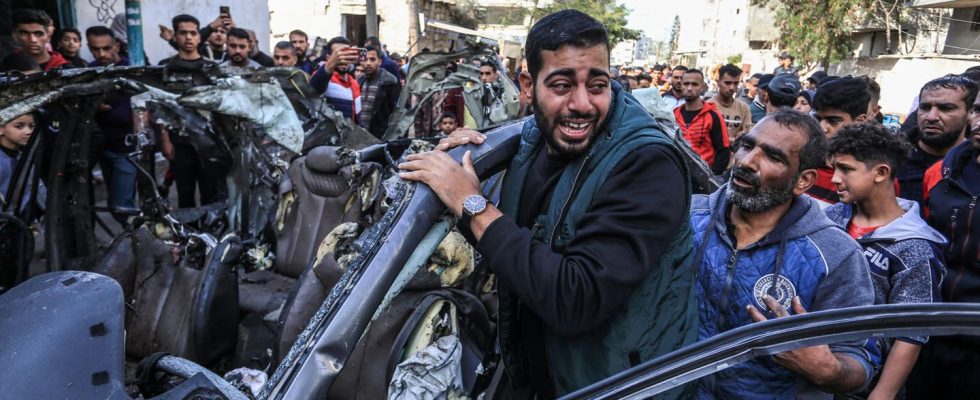War against Hamas
Genocide accusations against Israel: What is true about South Africa’s allegations?
A man cries next to a car hit by an Israeli drone.
© Abed Rahim Khatib / DPA
Just a few weeks after October 7th, Israel was accused of genocide against the Palestinians in the Gaza Strip. Now the country has to answer for it in court.
The plaintiff cites statements by Israeli ministers as further evidence. Threats to make Gaza uninhabitable and demands from right-wing extremist ministers to permanently expel Palestinians are cited. (You can read more about this here.) It is a “direct and public incitement to genocide”.
The basis for the lawsuit is the UN Genocide Convention. Both states have signed this convention and thereby committed themselves not only not to commit genocide, but also to prevent and punish it. But what does that mean exactly?
What is genocide?
The term genocide is equated with genocide and goes back to the Holocaust perpetrated by the Nazis. It was introduced by the Jewish lawyer Raphael Lemkin to describe the murder of Jews. Lemkin also advocated for the genocide to be punished under international law. The term was incorporated into the Geneva Convention in 1948.
Lawyers speak of genocide or genocide when the following acts are committed for racial, ethnic or religious reasons:
- killing
- serious physical or psychological harm to members of a group
- Imposition of living conditions that can completely destroy members or entire groups
- Measures that prevent births within a group
- forcible transfer of children to another group
There are several examples of genocide: including the crimes committed by the German colonial power against the Herero and Nama people in 1904 and 1908. The UN war crimes tribunal for Rwanda described the killing of hundreds of thousands of Tutsi in Rwanda (1994) as genocide. The starvation deaths of millions of Ukrainians and farmers of other nationalities by the Soviet Union in the 1930s (Holodomor) were described as genocide by a Ukrainian court. Kiev and Moscow are currently accusing each other of genocide again in connection with the Russian invasion. The International Court of Justice and the UN War Crimes Tribunal for Yugoslavia have also described the mass murder of the Serbs against the Bosniaks as genocide. And the German Bundestag speaks of a genocide in view of the killing of countless Yazidis (2014-2017) by the Islamic State.
There can only be one motif
According to international law, the intention behind all these measures must be to destroy a group. “However, the goal does not have to be achieved in order to fulfill the offense and be punished for genocide,” says Lisa Wiese from the Institute for International Law at the University of Leipzig star. The decisive factor is the intention to destroy, which “is usually very difficult to prove”. The number of victims is rather insignificant, but could indicate corresponding intentions.
According to a ruling by the International Court of Justice in the case of Croatia versus Serbia in 2005, the intent to destroy must be the only motive. As soon as other reasons become apparent, the crime of genocide can be rejected. “The destruction of the group must be the perpetrator’s only goal,” emphasizes Wiese.
Initially no evidence of genocide in the Gaza Strip
According to lawyers, the case in the war between Israel and Hamas is difficult to assess. “Even if individual actions by the Israeli armed forces can be described as war crimes, they do not at the same time constitute genocide,” says Matthias Hartwig from the Max Planck Institute for Comparative Public Law and International Law star. So far, Israel has not expressed any intention of wiping out the population in the coastal strip. The military analyst at the Institute for National Security Strategy (INSS) in Tel Aviv, Kobi Michael, simply said in a ZDF interview that Israel must “eliminate Hamas as a military organization.”
Legal scholar Lisa Wiese from the University of Leipzig also admits that Israel has a right to self-defense under international law. This includes the use of military force – within the framework of international humanitarian law. In another case, the International Court of Justice also found that threats of violence or acts of violence against another state alone are not sufficient to speak of genocide.
What’s next?
South Africa will explain its complaint on Thursday. The next day Israel has the opportunity to respond. This hearing will initially focus on an urgent application by South Africa, which the judges will decide on in a few weeks. However, genocide trials can drag on for years.
Sources: Federal Agency for Civic Education, House of the Wannsee Conference, Genocide Convention“The Guardian“, ZDFwith material from DPA and AFP.
The article first appeared on November 2, 2023 at stern.de and will be updated.


